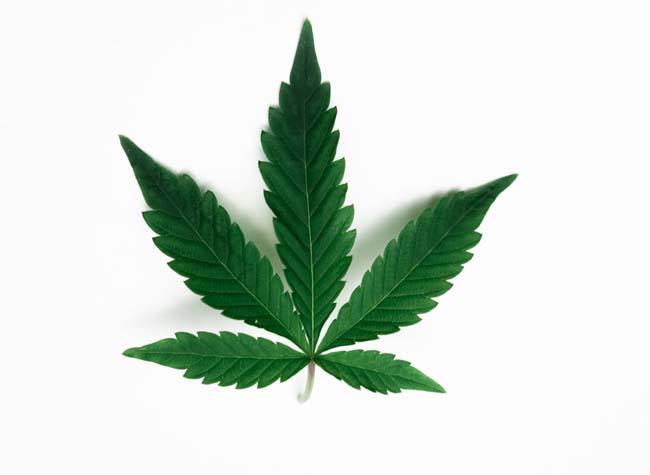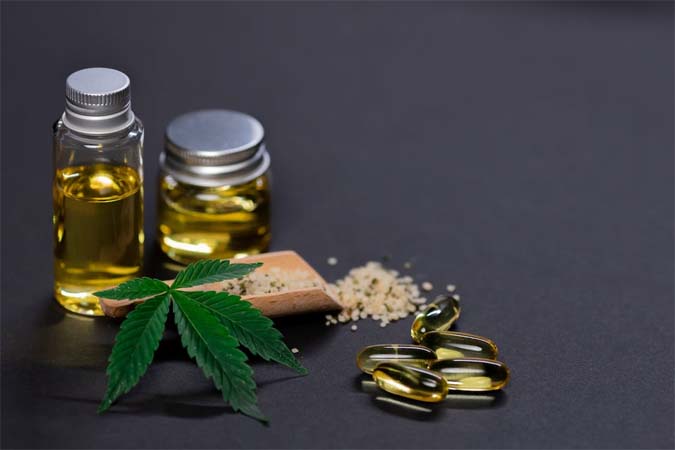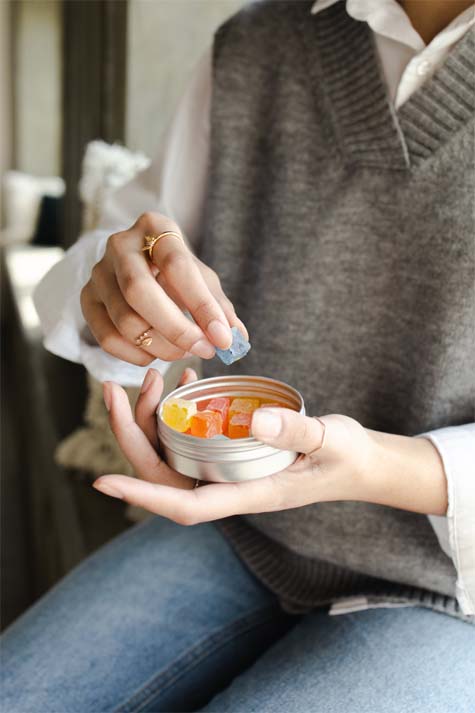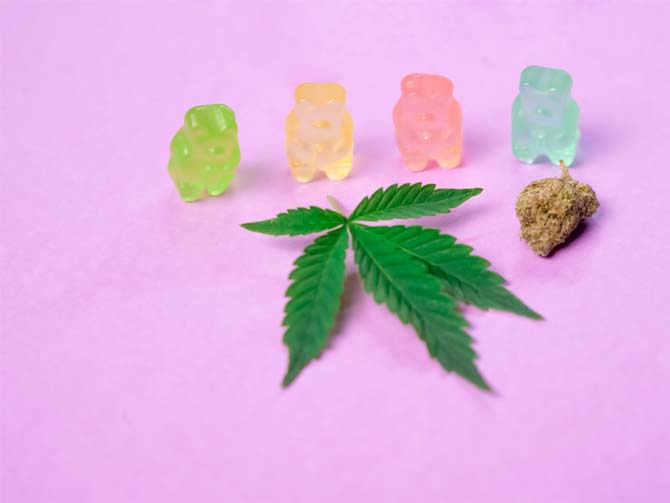CBD
Safe & Effective?
CBD comes from the Cannabis sativa plant, which includes the species hemp and marijuana. These 2 terms are often used interchangeably but they do not exactly have the same meaning, which we will explore later in this article.
Like all plants, the Cannabis sativa has many naturally occurring chemicals. One of the best-known chemical derivatives (cannabinoids) of the Cannabis sativa plant is CBD, short for cannabidiol.
We are now hearing a lot about CBD because as the laws surrounding
cannabis and its derivatives continue to loosen, interest in CBD as a ‘healthy
alternative’ to prescription drugs has led to the prospect that CBD can be an effective way to deliver
a good number of safe health benefits without also delivering a 'high'.
CBD can be found in oral sprays, oils, capsules, ‘gummies,’ pre-rolled joints, and even CBD infused apples, beets, dried figs, and infused chocolate, among others. Wherever cannabis is legal, CBD retailers have popped up, and the Internet has been overrun with CBD retailers and CBD promises.
WHAT DOES THE USE OF CBD PROMISE?
The claims on some websites promoting CBD fall short of making actual promises by saying cannabidiol ‘may’ be relaxing and mood uplifting, or it can even increase certain cognitive functions. But there are many others that do promise that ingesting CBD will safely cure insomnia or anxiety and even fight cancer.
It is not unusual for people to believe that it is safe to consume CBD because it is an FDA-approved drug. Many also believe it is safe because it is natural, since it comes from a plant. One could think this must mean that it is both safe and effective, especially to help one to sleep better and to get pain relief.
But is it safe and effective for human consumption?
CBD-
SAFE FOR HUMAN CONSUMPTION?
There can’t be a discussion about whether CBD is safe for human consumption without first including more information on hemp and marijuana, and the cannabinoid THC.
As stated above, hemp and marijuana are both varieties of the Cannabis sativa plant. Both plants have similarities but the significant difference between the two varieties is the THC content, because THC is the cannabinoid chemical found in the cannabis plant that is primarily responsible for the ‘high’ associated with cannabis use.
HEMP
Hemp is cannabis that contains 0.3% or less THC content by dry weight. Because the THC level in hemp is so low, it is unlikely to produce a ‘high.’
The hemp plant is mainly cultivated as a source of hemp fiber, which includes foods and beverages as well as other derived products such as CBD, personal care products, and nutritional supplements.
The hemp plant is an annual herb with palm-like leaves bunched near the top of each stem, which can grow as high as 20 feet. The hemp plant can grow in most climates and requires little care.
MARIJUANA
Marijuana, also known as ‘weed,’ among many other names, is cannabis that has more than 0.3% THC by dry weight. Marijuana plants can contain 25% THC or more and are generally used medicinally or recreationally as a psychotropic drug.
The marijuana variety of the Cannabis sativa plant is shorter than the hemp plant, resembling a bush with palm-like leaves and buds surrounding the body of the plant. Growth is carefully monitored and controlled in an isolated, warm, humid area to maximize its psychoactive uses.
THC
THC or Tetrahydrocannabinol usually refers to Delta-9-THC. It is one of the 113 cannabinoids that have so far been identified in the cannabis plant, and it is the most potent. There are 2 other commonly known THC delta products as well. Delta-8 THC is about 70% as potent as Delta-9 THC and Delta-10 THC is approximately 60% as potent as Delta-9 THC.
It is also important to note that not all THC products are approved by the FDA. What always counts is the concentration of THC in any product.
THE LEGALITY OF
HEMP & MARIJUANA
Please note that the legality of hemp and marijuana varies by location. The 2018 Farm Bill made it legal to grow hemp, or cannabis containing less than 0.3% THC, throughout the United States and it also made hemp-derived CBD products federally legal.
Marijuana, or cannabis containing more than 0.3% THC, is not federally legal. State laws, on the other hand, vary. In some states Marijuana is allowed to be used medically and recreationally. In other states, only medically, and in some states, it is still completely illegal.
Please click here to see the latest marijuana legality by state.
THE EFFECT OF CANNABIS
ON THE HUMAN BODY
The effect of cannabis on the human body is largely due to our endocannabinoid system. This is a signaling system that all vertebrates have. Tied to our nervous system, it plays various roles having to do with appetite, inflammation, mood, and more.
Our bodies produce endocannabinoids which bond to specific receptors, activating them and leading to changes in the body. These receptors can be activated by cannabinoids made outside the body as well.
Since there are over 100 different cannabinoids compounds that are contained in the cannabis plant, these compounds can interact with our endocannabinoid system when ingested in our body.
There are some less common cannabinoids of the cannabis plant that have also been identified. These include CBN (Cannabinol), THCA (Tetrahydrocannabinol acid), and CBG (Cannabigerol).
Each of these, and more will be introduced as time goes on, have their own promise of benefits, but all need much more scientific research, especially with human trials, to determine their safety or efficacy.
Since CBD and THC are the two best studied cannabinoids, we know that THC can produce a ‘high’ but there remains quite a bit of debate over what CBD actually does in our bodies.
CBD-CONTAINING PRODUCTS
THAT HAVE BEEN APPROVED
AS DRUGS FOR
SPECIFIC APPLICATIONS
There are a couple of CBD-containing products that have been approved as drugs for specific applications:
- Epidiolex. This is a highly purified CBD medication that is approved to treat seizures associated with some types of epilepsy and tuberous sclerosis complex, a genetic disorder that leads to the growth of non-cancerous tumors.
- Sativex. This is an equal mixture of CBD and THC which is approved in some countries for symptoms of multiple sclerosis.
CBD-
EFFECTIVE FOR HUMAN AILMENTS?
Results of current studies of cannabis and
its derivatives, especially CBD, have thus far yielded negative results or results with very low certainty and weak evidence.
Nevertheless, there have been some promising results:
- CBD for PAIN RELIEF. Studies are promising, though many of them have bundled together CBD with other cannabis derivatives. However, studies in 2023 did show that chronic pain could be reduced by 30% when patients used cannabis or one of its related derivatives (like CBD).
- CBD for SLEEP. It is thought that CBD might be useful for sleep,
but results vary depending on the kind of health condition the patient had that
might be causing sleep problems.
- CBD for ANXIETY, which could have an impact on sleep, has been found to work in rats, but the tests in humans have so far had too many drawbacks. Nonetheless, the results have been encouraging. Larger numbers of human participants and more testing must be performed.
- CBD or THC in CANCER or NEUROLOGICAL DISEASES. Studies done in laboratory animals are promising, but not enough human trials have been done. The results are negative so far in studies done to see if CBD or THC can improve the quality of life in patients with cancer or neurological diseases like multiple sclerosis.
- CBD for MULTIPLE SCLEROSIS. This disease often causes muscle stiffness known as spasticity. There is some quality evidence that cannabinoids in general, which include CBD, can decrease spasticity in people with multiple sclerosis. These studies, however, tend to be too short for meaningful information.
- CBD for SCHIZOPHRENIA, CROHN’S DISEASE, and ULCERATIVE COLITIS. The evidence for the use of CBD for relief from symptoms of these diseases is insufficient and uncertain.
- CBD for PARKINSON’S DISEASE. Again, the use of cannabis as a whole is encouraging, but larger and more rigorous trials are needed.
Since CBD is usually seen as a harmless cure-all, we must make note of the fact that even though there have been some benefits of taking CBD for a limited number of conditions and a long list of other conditions show promise, we must realize the studies thus far have not been that informative.
IS CBD SAFE?
CBD is a chemical and thus there are risks attached to it which often go unmentioned. Although many may still think since cannabis is a plant, it must be safe, the safety of chemicals in humans has nothing to do with whether they are natural or synthetic. For example, many herbs used in traditional Chinese medicine cause liver damage. Poison Ivy is a plant but the results of rubbing up against it are certainly not harmless.
At this point in time, studies involving CBD taken by mouth in human participants report that CBD is safe and that there were few adverse events. There are some caveats though:
- The safety assessment of these studies relies only on the immediate effects the participants would report. What this means is that the metabolism of CBD in the human body has not been well understood and clinical trials do not consider how the body metabolizes CBD over time.
- It has been found that the amount of CBD that is taken by mouth and ends up in the blood varies depending on whether it is taken while eating. When fasting, 6% of the dose ends up in the blood. When consumed with a high-fat meal, the figure goes up to 19%. This could have an impact on the effect CBD has on the body.
- CBD taken by mouth can also damage the liver. Up to 1 in 5 of those people involved in clinical trials of Epidiolex for epilepsy had higher than normal levels of liver enzymes. Some patients even had to leave the trials because of this.
- There is also strong evidence found with non-human animal species that CBD can cause problems with the male reproductive system by lowering the number of sperm cells.
- Because of how CBD is broken down in the body, it has the potential to interact with other drugs a person is taking. It can make the levels of these drugs higher or lower in the body.
- The optimal doses of CBD are not yet known.
Aside from the side effects that have been reported, such as dry mouth, drowsiness, nausea, reduced appetite, and diarrhea, whether CBD can cause actual bodily harm over time may not be immediately apparent. At least we know that CBD is not habit forming!
INACCURATE LABELING OF COMMERCIAL PRODUCTS CONTAINING CBD & THC
When tested, commercial
products sometimes turn out not to be what they seem. Labels don’t tell the
whole story. In tests, it is often revealed that there are different amounts of CBD and THC than
what is on the label, and that these products are regularly contaminated with heavy metals. It
is even the case that some products claiming to be CBD may contain none of it!
Some of these commercial products may be tested and licensed and these may more likely have accurate labeling. Also, a group at the Mayo Clinic is educating clinicians on this topic and recommends looking for sellers that have quality standards. One of these standards is the Current Good Manufacturing Practices (CGMP) certification.
Because CBD is not just a medication but also sold as a natural health product, it is important to remember that natural health products are poorly regulated, and it is up to consumers to do their own due diligence.
SUMMARY
CBD is a drug and as such it is not an all-natural cure-all. Even when it is not regulated as a drug, it should be treated as one.
Though there have been many claims about the potential health benefits of CBD, most of these claims come from promising studies done in laboratory animals. Studies done thus far in humans show unclear results overall.
Be careful when using non-licensed CBD products because they are often inaccurately labeled and can be contaminated with heavy metals.
Unfortunately, the true effectiveness of CBD and its long-term safety is still in doubt. The legality and the increased interest in this drug should lead to longer and stronger clinical trials to prove or disprove conclusively the promise of its health benefits for humans.
Please note: Much of the information in this article was used with permission from the McGill University Office for Science and Society.
"The Cleanest Clean You've Ever Seen."
by
ABC Oriental Rug & Carpet Cleaning Co.
130 Cecil Malone Drive Ithaca, NY 14850
607-272-1566












